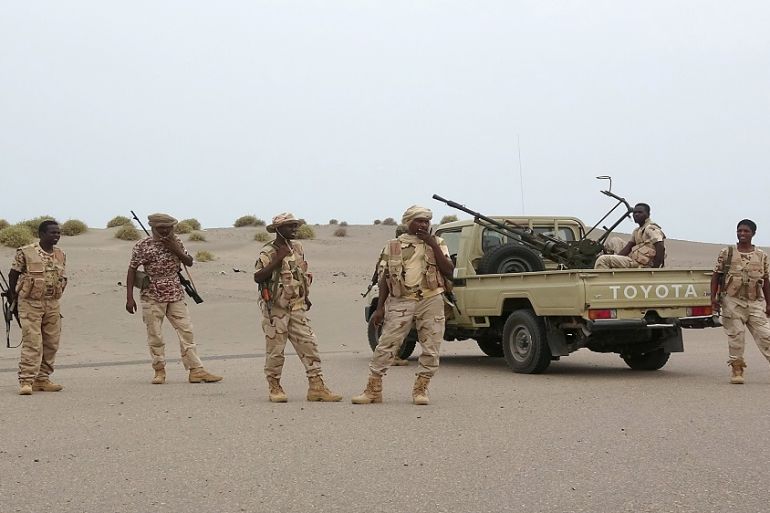Sudanese demand UAE apology over Haftar recruitment
UAE-based security firm has denied allegations of lying to Sudanese about the nature of their expected work in Libya.

Hundreds of Sudanese protested outside the United Arab Emirates embassy in Khartoum on Tuesday against a dubious recruitment drive to fight for renegade Libyan commander Khalifa Haftar’s forces.
Demonstrators demanded an “apology and compensation” from the UAE authorities for being deceived by Emirati company Black Shield Security Services and forced to serve in Haftar’s militias instead of the jobs promised as ordinary security guards.
Keep reading
list of 4 itemsCIA chief visits Libya after Lockerbie suspect handover
Libya: Violence to Votes
In Libya, anger and uncertainty after polls delayed
“We demand an apology from the UAE to the Sudanese people because we are not mercenaries,” said Abu Alma Ali Hamza Taha, a protester.
Ahmad Babakr, another demonstrator, threatened to take the issue to the United Nations and human rights groups “if the UAE embassy failed to respond to our demands”.
|
|
Black Shield Security Services has previously denied allegations of lying to Sudanese nationals about the nature of their expected work in Libya.
Failed assault
The UAE – a main backer of Haftar along with Egypt and Russia – has been accused by the United Nations and rights organisations of breaking a UN arms embargo on Libya by sending weapons and mercenaries to fight for Haftar’s self-styled Libyan National Army (LNA).
A UN report last October said thousands of Sudanese were fighting alongside the LNA against forces from the Tripoli-based Government of National Accord (GNA).
Haftar’s forces have been on the back foot after military support from Turkey helped GNA fighters repel his 14-month assault to seize the capital, Tripoli.
The GNA has recaptured the key al-Witaya airbase and the city of Tarhuna in recent weeks, and now has set its sights on the strategic city of Sirte.
Haftar has deployed thousands of foreign mercenaries, including Sudanese and Chadian fighters, for the looming battle for the city – the last significant settlement before the traditional boundary between Libya’s west and east. Whoever controls Sirte controls Libya’s main oil export ports.
Sudan crackdown
The presence of Sudanese men deceived by the UAE’s Black Shield Security Services and taken to Libya has been widely reported by the United Nations.
Sudanese authorities in June, meanwhile, arrested more than 100 citizens who were set to travel to Libya for combat.
State news agency SUNA quoted Brigadier Jamal Jumaa, spokesman for the Rapid Reaction Forces, as saying “joint security forces detained 122 outlaws, including eight children, who were heading to fight as mercenaries in Libya.”
SUNA published a video showing dozens of young men sitting on the ground, surrounded by military vehicles carrying soldiers armed with assault rifles.
The UN report last year said thousands of Sudanese militiamen were stationed in the eastern Libyan city of Benghazi.
The paramilitaries were deployed to protect oil infrastructure while Haftar’s main forces continued their attack on Tripoli, it said.
‘Drums of war’
GNA spokesman Mohamad Gnounou pledged on Tuesday that its forces would advance towards the “cities taken hostage” and “eradicate all outlaw groups” – an allusion to pro-Haftar forces.
Egypt’s military said on Saturday that it had carried out exercises involving navy, air force, and special forces near the Libyan border in response to the “severe and rapid changes” in the region.
The UAE on Tuesday issued an implicit warning to GNA forces advancing on Sirte.
“The drums of the war raging around Sirte in Libya threaten serious developments and dangerous humanitarian and political consequences,” tweeted Anwar Gargash, minister of state for foreign affairs.
|
|
“We in the UAE call for an immediate ceasefire and for wisdom to prevail,” he added, calling for inter-Libyan dialogue “within clear international frameworks”.
Years of international efforts have so far failed to bring a lasting peace to the North African country, which has the continent’s largest proven oil reserves.
Egyptian President Abdel Fattah el-Sisi in June called Sirte a “red line” for Egypt, while Turkey has urged Haftar to withdraw from the strategic city and negotiate a ceasefire.
Libya analyst Jalel Harchaoui of the Clingendael Institute in The Hague said despite the rhetoric, he did not see the imminent risk of a major military escalation.
“The military reality around Sirte has not changed significantly in the past two weeks,” said Harchaoui.
Sirte remained well-defended by pro-Haftar Russian and Syrian mercenaries with UAE logistical support, as well by dangerous minefields to the west of the city, he added.
“Cairo’s political desire for a visible and official Egyptian intervention remains very tenuous,” Harchaoui said.
At a time of regional economic and coronavirus pandemic woes, he continued, “Egypt has other problems at the moment.”